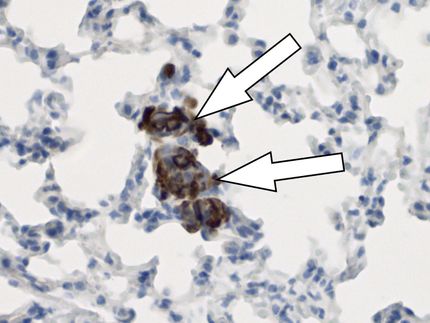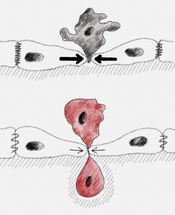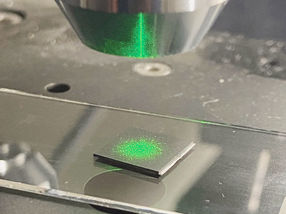Cyclin D1 governs microRNA processing in breast cancer
Cyclin D1 controls cell cycle progression and microRNA biogenesis through Dicer -- a new mechanism promoting breast cancer
Cyclin D1, a protein that helps push a replicating cell through the cell cycle also mediates the processing and generation of mature microRNA (miRNA), according to new research in Nature Communications. The research suggests that a protein strongly implicated in human cancer also governs the non-protein-coding genome. The non-coding genome, previously referred to as junk DNA, makes up most of the human genome, and unlike the coding genome, varies greatly between species.
"In addition to its role in regulating the cell cycle, cyclin D1 induces Dicer and thereby promotes the maturation of miRNA," says lead researcher Richard Pestell, M.D., Ph.D., Director of the Kimmel Cancer Center at Thomas Jefferson University and Chair of the Department of Cancer Biology. Dicer is a protein that converts inactive hairpin-structured microRNA precursors into their active single stranded form. "The work supports the idea that cancer-causing proteins like cyclin D1 may drive cancer progression in part via miRNA biogenesis."
Using antisense RNA, Dr. Pestell's group was the first to show that cyclin D1 drives mammary tumor growth in vivo. In prior work, they showed that cyclin D1 regulates the non coding genome, and that the non-coding genome, in turn, regulates expression of cyclin D1. Furthermore, the group showed that many cancer patients encode a form of cyclin D1 that evades negative feedback from the non coding genome. These attenuating feedback loops between the non coding and coding genome may be a common theme in cancer and other biological processes.
In the current study, the group sought to investigate the mechanism by which cyclin D1 regulates the biogenesis of non coding miRNA. Dr. Pestell and colleagues developed transgenic mice that could induce cyclin D1 expression in the breast and examined cells with cyclin D1 gene deleted. The researchers noticed that cells lacking cyclin D1 produced less of the miRNA-processing protein, Dicer, and therefore had reduced levels of mature miRNA.
The group also examined cells lacking Dicer, and noted many similarities between Dicer-lacking and cyclin D1-lacking cells, in addition to failure of miRNA processing, suggesting a deeper connection between these two processes.
In addition to the in vitro studies, the researchers also examined over 2,200 patient samples. They found that patients with the luminal A subtype of breast cancer had increased levels of expression of both cyclin D1 and Dicer. Luminal A subtype of breast cancer is the most common type and also has the best prognosis. The more aggressive basal-like subtype of breast cancers, however, exhibited lower levels of cyclin D1 and Dicer, which would in turn globally reduce the level of mature miRNA. Indeed, lower levels of miRNAs have been observed in a number of human cancers.
"By linking the decrease in miRNA levels to Dicer, we show that a global decrease in miRNA processing may be important in the initiation and progression of certain cancers," says first author, Zuoren Yu, Ph.D., who holds a joint appointment at Jefferson's Kimmel Cancer Center and Tongji University School of Medicine in Shanghai, China.
Because the cyclin D1 gene has been implicated in a variety of other human cancers these findings may have broad implications for processing of non coding RNA in human tumorigenesis.
Most read news
Organizations
Other news from the department science

Get the life science industry in your inbox
By submitting this form you agree that LUMITOS AG will send you the newsletter(s) selected above by email. Your data will not be passed on to third parties. Your data will be stored and processed in accordance with our data protection regulations. LUMITOS may contact you by email for the purpose of advertising or market and opinion surveys. You can revoke your consent at any time without giving reasons to LUMITOS AG, Ernst-Augustin-Str. 2, 12489 Berlin, Germany or by e-mail at revoke@lumitos.com with effect for the future. In addition, each email contains a link to unsubscribe from the corresponding newsletter.























































